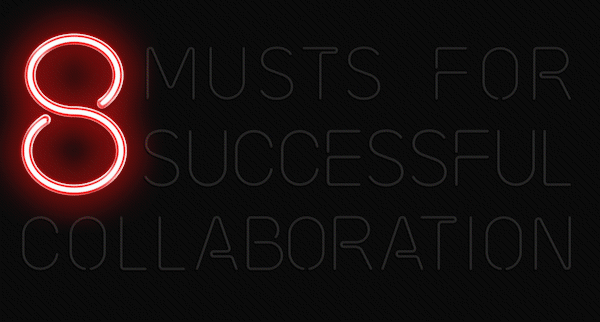Month: June 2018
8 Musts for Successful Collaboration
Here are the 8 Must Do’s to help you and your team achieve that, and in effect lower the high risks involved in any project.
1. Begin at Home
Teamwork must begin at home. It requires a cultural change for some organizations, like developing mechanisms for continuous evaluation and refinement of the effectiveness of the strategies in-house. Systematic implementation will take time because it’s a bottom-up process.
2. Shared Vision
Positive compromise and synergy can only take place in the context of a vision or goal shared by the entire team. A shared vision must be created in the present to lead a team effectively into the future with energy and focus.
3. Synergy
An environment must be created which encourages integrative thinking with the open exchange and consideration of ideas. With the combining of resources and knowledge base, innovation is supported and the whole can become greater than the sum of its parts.
5. Commitment
Team members must feel that there is a commitment among the team to build relationships and resolve disputes equitably. The team must have confidence in this commitment in order to learn lessons from their experiences. Commitment aligns the interests of the team members for the good of the project.
5. Trust
Working together is impossible where there is cynicism about others’ motives. Understanding other risks and goals lead to better personal relationships. With understanding comes trust and with trust comes the possibility for a more productive relationship. There must be an atmosphere of Trust so team members can combine resources and knowledge and put adversarial conflicts away. This creates synergy within your team.
6. Shared Rewards & Risk
Working together is enhanced by mutual rewards. Risks are shared based on the relative investment of each member in the project and the reward each member expects upon successful completion of the project.
7. Build Competitive Advantage
In the team context, each member is free to fulfill the role they serve best, supported by their teammates. Each of the team members must have equity in building the competitive advantage of the team as a whole. By working together to lower costs and increase the quality of their product they assure the long-term commitment on the part of their clients and each other to the future of the team.
8. Evaluate Results
Teamwork is a cyclical process and in an open and continuous manner, you must evaluate the results of efforts that arise from collaboration. Timing is critical in this process since some efforts take longer to implement, some even a full cycle. Debriefing is critical to maintaining the other eight techniques above functioning to their full beneficial potential.
